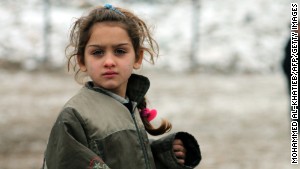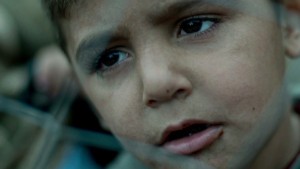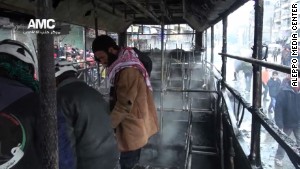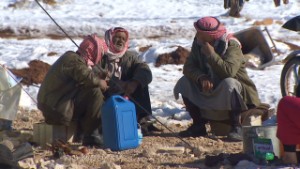Editor's note: Gayle Tzemach Lemmon is a fellow and deputy director of the Women and Foreign Policy Program at the Council on Foreign Relations. She wrote "The Dressmaker of Khair Khana," a book that tells the story of an Afghan girl whose business created jobs and hope during the Taliban years.
(CNN) -- The world has devoted a great deal of diplomatic energy to securing Syria's chemical weapons. It has yet to do the same for securing Syria's children.
Their future is as important for international security and stability, even if the consequences of inaction will take far longer to be seen and felt.
 Gayle Tzemach Lemmon
Gayle Tzemach Lemmon The war in Syria between the government of Bashar al-Assad and forces opposed to him has ground on for more than two years and claims new victims each day. More than 100,000 have been killed. Starvation has become a gruesome reality, with a religious leader now saying it is OK to eat cats and dogs given the lack of much of anything else.
Polio, likely brought by foreign fighters, has resurfaced to claim tiny victims younger than 2. In the past two weeks, barrel bombs -- drums filled with shrapnel and explosives -- are reported to have killed more than 500 people in the city of Aleppo.
 A Syrian girl plays in the city of Aleppo, bombed two days after this photo was taken on December 13.
A Syrian girl plays in the city of Aleppo, bombed two days after this photo was taken on December 13. According to the Syrian Observatory for Human Rights, a UK-based group with links to Syrian opposition, children accounted for more than 150 of the dead.
Refugees fleeing the conflict, most to Syria's overwhelmed neighbors Jordan and Lebanon, top a whopping 2 million. Some U.N. officials expect that number to climb as high as 4 million in 2014. More than 1.1 million of these refugees are younger than 18. Indeed, Syria's youngest citizens are paying dearly for a war they did not create, one that is laying waste to their present and their future.
Three out of four Syrian children "have lost a close friend or family member in their country's ongoing conflict" and "many have witnessed violence," notes the International Rescue Committee. Charities such as IRC and Mercy Corps working with Syria's children tell of young people isolated, lonely and struggling with the impossible task of coming to terms with all that they have seen and lost.
"If we do not act quickly, a generation of innocents will become lasting casualties of an appalling war," U.N. High Commissioner for Refugees António Guterres said in November when releasing a report on the grim future facing Syria's children.
"A grave consequence of the conflict is that a generation is growing up without a formal education," the report said. "More than half of all school-aged Syrian children in Jordan and Lebanon are not in school. In Lebanon, it is estimated that some 200,000 school-aged Syrian refugee children could remain out of school at the end of the year." They join 25 million kids of primary-school-age around the world out of school because of war.
 Syria in review
Syria in review  Rocket strike kills at least 25 in Aleppo
Rocket strike kills at least 25 in Aleppo  UNICEF: Syria largest humanitarian crisis
UNICEF: Syria largest humanitarian crisis These numbers matter and well beyond Syria's borders.
As U.S. Education Secretary Arne Duncan has often noted, security and education are bound together: Low educational attainment is among the strongest predictors of violence. Anyone hoping for a safer, more secure world had better start with educating children.
And yet until now, the international community's reaction to the escalating death count and the rising number of hungry, homeless and displaced children has fallen somewhere between a shrug and a sigh. Although U.N. agencies have released a slew of dire warnings about the situation's urgency and its gravity, it is unclear anyone is listening, let alone ready to act to change the calculus on the ground.
In September, a round of feverish and focused diplomacy unfolded between Russia and the United States to reach a deal with the Assad regime on its chemical weapons.
No nations have engaged in such fully concentrated diplomacy to open and secure humanitarian corridors and bring supplies to cities being starved and cut off from the rest of the world -- and to make sure Syria's children don't go hungry. Although chemical weapons may be close to being secured, conventional weapons face no such limitations and are being used to kill, injure and maim with impunity.
This leaves children to pay the price. And so will the rest of us, eventually, if nothing is done to help a lost generation find a way to a more secure future.
Follow us on Twitter @CNNOpinion.
Join us on Facebook.com/CNNOpinion.
{ 0 comments... read them below or add one }
Post a Comment